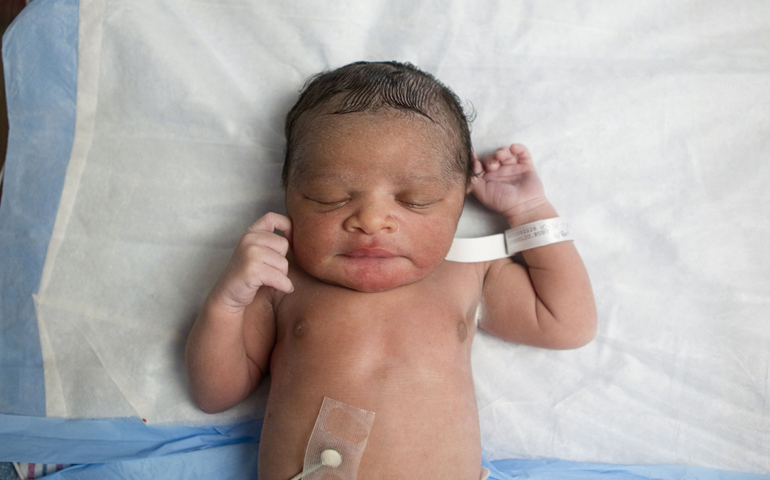
A newborn baby sleeps at Wyckoff Heights Medical Center in Brooklyn, N.Y., in this 2011 file photo. (CNS/Lucas Jackson, Reuters)
I experienced a miracle!
A few days ago, I held in my arms my first grandbaby -- newly born Faith Annmarie.
Thank God she's healthy and perfectly formed. And as I was looking at her, I reflected how wonderfully she is made -- arms, hands, fingers, legs, feet, toes, eyes, mouth, nose, ears, as well as what I couldn't see but was just as real -- hundreds of different tissues, dozens of organs including the remarkable brain, and trillions of cells.
And then I reflected on her eternal soul, the crown-jewel -- that human and divine-like aspect which will later give her the capacity of free will and reason.
I marveled at the goodness and awesomeness of our Creator. And I recalled the psalmist praising God with these beautiful words: "You formed my inmost being; you knit me in my mother's womb. I praise you, because I am wonderfully made; wonderful are your works!"
And then I thought that this new baby, my granddaughter, did not all of a sudden come fully and perfectly formed at birth -- as though by magic. No, she had miraculously developed step-by-step for nine months prior to birth in her mother's womb. Yes indeed, as Psalm 139 proclaims: Oh God, "you knit me in my mother's womb."
Just think of the awesomeness of how human life comes into existence. According to Medline Plus of the U.S. National Library of Medicine, when a single sperm and the mother's egg unite conception occurs. This new single cell known as a zygote contains all of the genetic information (DNA) needed for the new human being to develop throughout life.
Just think about it: Your life started as a single-cell zygote. And now look at you!
At around four days, the zygote, now consisting of 32 cells, becomes known as an embryo. During the next seven and a half weeks the human embryo develops all of the body's systems and structures.
At four weeks in utero the human heart is growing at an astounding rate of 1 million cells per second, according to Alexander Tsiaras, medical image-maker and founder of TheVisualMD.com, a compendium of health visualizations.
Following the eighth week after conception, the baby is known as a fetus. At this point of development, organs like the brain, liver and kidneys start functioning inside the tiny human life. Life support systems continue growing and becoming ever more sophisticated until the baby is able to live outside the mother's protective and nurturing womb.
All of this is truly too miraculous for words. So, take a look at this remarkable video [contains some nudity] titled "From Conception to Birth" produced by Tsiaras and presented at a TED Talk.
When honestly examined with a humble, open mind and open heart, the absolutely amazing creation and development of each human being points directly to an awesome, generous, loving Creator.
But if that's not enough, and indeed it should be, science is crystal clear that human life begins at conception.
Years ago, while attending a pro-life conference sponsored by Americans United for Life, I asked the late world-renowned French geneticist Dr. Jerome Lejeune when human life begins. He instantly replied, "At conception of course."
And Dr. Lejeune is not alone here. Far from it.
The late professor emeritus of medical genetics at the Mayo Clinic, Dr. Hymie Gordon, said "By all the criteria of modern molecular biology, life is present from the moment of conception."
In his medical textbook "Human Embryology," the late Dr. Bradley M. Patten, Ph.D., states, "Conception marks the initiation of a life of a new individual."
There is never a good reason for killing an unborn human baby.
Let all believers in the God of life tirelessly pray and work for the day when every marvelously created human life is welcomed into the world as the wonderful gift he or she is.
[Tony Magliano is an internationally syndicated social justice and peace columnist. He is available to speak at diocesan or parish gatherings about Catholic social teaching. His keynote address, "Advancing the Kingdom of God in the 21st Century," has been well-received by diocesan gatherings from San Clemente, Calif., to Baltimore. His email address is tmag@zoominternet.net.]
Editor's note: We can send you an email alert every time Tony Magliano's column, "Making a Difference," is posted. Go to this page and follow directions: Email alert sign-up.


